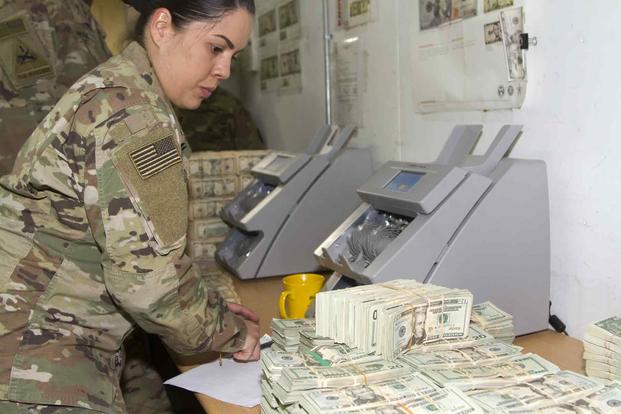Months after Congress gave the Pentagon the authority to give bonuses this year to junior enlisted troops facing economic hardships and a month after lawmakers provided funding for the benefit, the department is still deciding whether to actually give out the bonuses.
After three weeks of being pressed by Military.com about whether it plans to pay out any economic hardship bonuses, the Pentagon sent a brief statement saying it is still evaluating what to do.
"The department's top priority is taking care of service members and their families," a Defense Department spokesperson said in an emailed statement Wednesday. "The implementation of this benefit is still being assessed. Beyond that, we have no additional information to offer at this time."
As part of the National Defense Authorization Act, or NDAA, that Congress passed in December, Defense Secretary Lloyd Austin was given the ability to approve monthly bonuses for any troops in the rank of E-6 or below if he determines that "prevailing economic conditions may adversely affect" them. The bill also left it to the secretary to set the rate of the bonus.
The bonuses were authorized only through this coming December, meaning there's just eight months left for the Defense Department to act.
Lawmakers included the bonuses in the defense policy bill amid concerns that troop pay was not keeping pace with the private sector or inflation. While basic pay for service members has risen 16.4% since 2020, including a 5.2% raise at the beginning of this year, inflation is projected to increase by 19.3% from 2020 through the end of 2024, according to a recently released House report on military quality of life.
Though Congress authorized the bonuses in December, it didn't provide funding for the benefit until late March, when lawmakers finally passed a bill to fund the Pentagon through the remainder of fiscal 2024. The fiscal year started in October, but months of congressional gridlock left the Pentagon and the rest of the federal government operating on stopgap funding that didn't adjust any spending levels from the previous year.
Congress approved $43 million to pay for the economic hardship bonuses, as well as the expansion of a benefit known as the Basic Needs Allowance for troops facing food insecurity.
In explaining their reasoning for the funding, lawmakers linked inadequate pay for junior enlisted troops to the military's ongoing recruiting struggles.
"The nation needs America's youth to strongly consider uniformed service," a report accompanying the spending bill said. "Exquisite weaponry and strategic concepts are of limited value unless they are operated by a fully manned, ready and motivated force."
The bill report, which does not have the weight of law, also requested the Pentagon brief the congressional defense committees on the department's plans to implement the economic hardship bonuses, among other issues related to junior enlisted pay, within 30 days of the spending bill becoming law.
That 30-day deadline came Monday, but a congressional aide told Military.com the briefing hasn't happened yet. The Pentagon, which typically adheres to briefing requests included in bill reports, also routinely misses congressional deadlines for briefings.
While the Pentagon dawdles on whether to give bonuses to junior enlisted troops this year, lawmakers are already working on other steps to improve service member compensation going forward.
The military quality-of-life report released by the House Armed Services Committee earlier this month recommended giving E-1s through E-4s a 15% raise, and committee leadership has introduced a bill to make the pay hike a reality. The committee has said the bill will serve as the basis for this year's version of the NDAA that the panel will begin debating next month.
Top senators have also expressed interest in reforming junior enlisted pay in this year's NDAA, though they have not released a blueprint like the House, and it's unclear how budget constraints will affect what Congress can ultimately approve.















